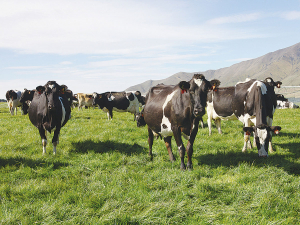Dairy Women’s Network welcomes AgriHealth as new partner
Dairy Women's Network (DWN) is welcoming AgriHealth as a new partner.
 The two-year study, which veterinarian Richard Nortje says is the first of its kind in New Zealand, was commissioned by AgriHealth.
The two-year study, which veterinarian Richard Nortje says is the first of its kind in New Zealand, was commissioned by AgriHealth.
A recent study has confirmed numerous benefits for dairy farmers to synchronising mating of heifers.
The two-year study, which veterinarian Richard Nortje says is the first of its kind in New Zealand, was commissioned by AgriHealth.
Comparing bull mating with synchronised mating following a DIB Co-Synch program, the study aimed to compare in-calf rates between the two groups.
“In terms of our trial set up, we had about 1450 heifers across five farms,” says Nortje.
He says the heifers were weighed within a month of the planned start of mating and the first DIB Co-Synch visit. The animals were then randomly allocated to either the synchrony group or the control group.
The study found a number of benefits, including higher in-calf rates, with more heifers from the synchronised group pregnant at the end of mating than in the control group.</p
“In terms of results, the key benefits of the synchrony was that there was on average 11 days more in milk compared to bull mating,” says Nortje.
He says there was a 55% average conception rate to the synchrony heat
Nortje says there were 3% more pregnant heifers, 11 days more in milk resulting in 13kg more milk solids per heifer.
Something else the study wanted to look at, according to Nortje, was whether there were any additional benefits to calving earlier.
For this part of the study, researchers measured premating heats and normal fertility outcomes during the heifers’ first lactation. “There were no further flow on benefits from the synchrony group,” says Nortje.
In other words, he says, all the benefits of synchronised mating were captured during the first mating period.
Global trade has been thrown into another bout of uncertainty following the overnight ruling by US Supreme Court, striking down President Donald Trump's decision to impose additional tariffs on trading partners.
Controls on the movement of fruit and vegetables in the Auckland suburb of Mt Roskill have been lifted.
Fonterra farmer shareholders and unit holders are in line for another payment in April.
Farmers are being encouraged to take a closer look at the refrigerants running inside their on-farm systems, as international and domestic pressure continues to build on high global warming potential (GWP) 400-series refrigerants.
As expected, Fonterra has lifted its 2025-26 forecast farmgate milk price mid-point to $9.50/kgMS.
Bovonic says a return on investment study has found its automated mastitis detection technology, QuadSense, is delivering financial, labour, and animal-health benefits on New Zealand dairy farms worth an estimated $29,547 per season.
OPINION: Staying with politics, with less than nine months to go before the general elections, there’s confusion in the Labour…
OPINION: Winston Peters' tirade against the free trade deal stitched with India may not be all political posturing by the…